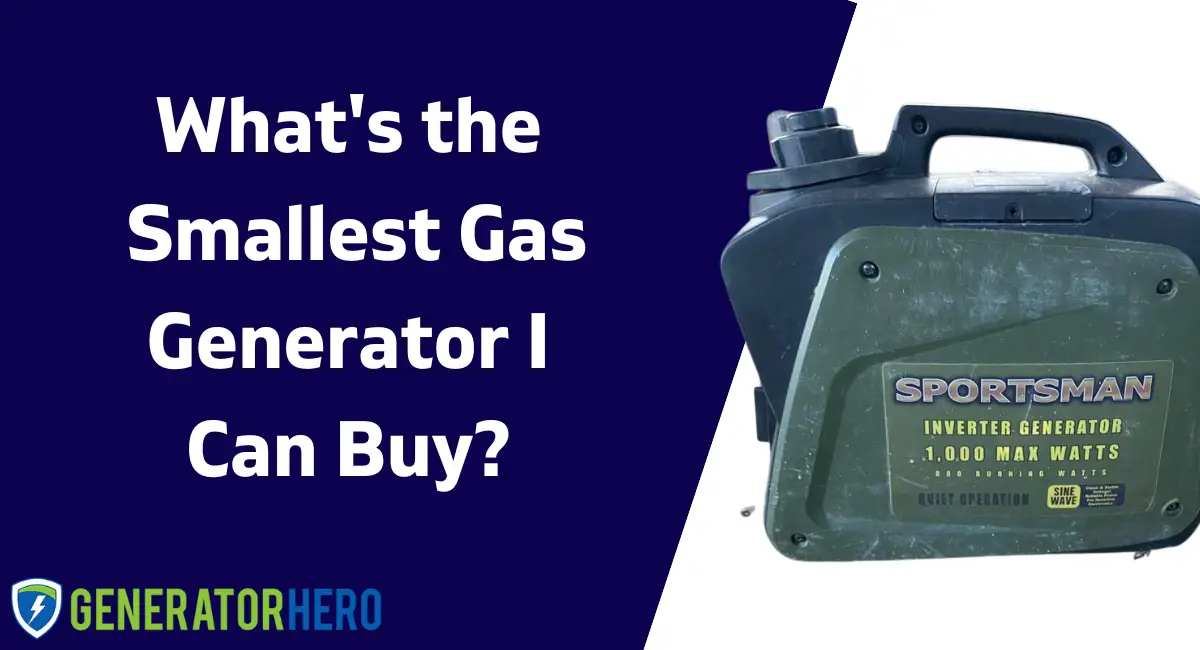Choosing the right generator is all about knowing what you plan on using it for. Some jobs will need a big whole-home type generator while others won’t need nearly that much. If you’re just needing something with a little bit of power for your job, then you can get away with a small gas generator.
In the crowded market of portable gas generators, what are the smallest gas generators and which are the best? Let’s dive in!
Table of Contents
Smallest Gas Generators that are Actually Good
| Generator | Size (inches) | Weight (pounds) | Wattage | Starting Watts | Run Time (hours) |
|---|---|---|---|---|---|
| Sportsman GEN1000i | 15.6 x 8 x 13.8 | 20.3 | 800 | 1000 | 6.3 |
| Genmax GM1200i | 16.5 x 9.4 x 15.7 | 25 | 1000 | 1200 | 6.5 |
| Honda EU1000i | 17.8 x 9.5 x 14.9 | 28.7 | 900 | 1000 | 6.8 |
| WEN 56125i | 17.25 x 9 x 15 | 36 | 1000 | 1250 | 5 |
| ECHO EGi-1200 | 16 x 11 x 16 | 30 | 1000 | 1200 | 5.2 |
| Powermate PM1200i | 15.7 x 10.3 x 18.3 | 33 | 1000 | 1200 | 5.5 |
What Makes a Gas Generator Small?
- Size dimensions: Small generators are typically designed to have a smaller physical footprint than larger generators. This means they can be more easily stored in smaller spaces, such as in a closet or storage shed.
- Weight: Small generators are often designed to be lightweight and easy to move around. This makes them ideal for outdoor activities like camping, where you may need to transport your generator over rough terrain.
- Power output: Small generators typically have a lower power output than larger generators, which can make them more affordable and easier to operate. However, this also means that they may not be suitable for powering larger appliances or equipment.

Advantages of Smaller Gas Generators
There are several advantages to using smaller gas generators compared to larger ones. Below are my favorite reasons to go small when you can:
- Portability: Smaller generators are typically designed to be more compact and lightweight than larger generators, making them easier to transport and move around. This makes them ideal for outdoor activities like camping, tailgating, and RVing, as well as for use in areas where power is not readily available.
- Lower fuel consumption: Smaller generators generally require less fuel to operate than larger generators, which can save you money on fuel costs in the long run. This also means that smaller generators are more environmentally friendly and produce fewer emissions.
- Quieter operation: Smaller generators are often designed to operate at lower noise levels than larger generators, which can be important if you plan to use your generator in residential areas or other noise-sensitive environments.
- Lower cost: Smaller generators are generally less expensive to purchase than larger generators, which can make them a more attractive option for those on a budget.
What Can you Run with a Small Gas Generator?
- Lights: A small gas generator can power several lights at once, depending on their wattage. For example, you could run four 100-watt bulbs or ten 40-watt bulbs at the same time.
- Small appliances: Small appliances such as a microwave, blender, or coffee maker. However, it may not be able to run larger appliances such as a refrigerator or air conditioner.
- Electronics: A 1000 watt generator can power electronics such as a laptop, TV, or radio.
- Power tools: A 1000 watt generator can power smaller power tools such as a drill, circular saw, or angle grinder.
It’s worth noting that the actual number of devices a 1000 watt generator can power simultaneously will depend on their power requirements. Always check the wattage of the devices you plan to use with your generator and make sure it doesn’t exceed the generator’s rated capacity.
Additionally, keep in mind that some appliances may have a higher surge wattage when starting up, which means they may temporarily require more power than their rated wattage.
Obviously smaller gas generators also have some limits when compared to bigger gas generators. For example, they typically have lower power output, which means they may not be suitable for powering larger appliances or equipment.
Additionally, smaller generators may have shorter run times/smaller fuel reservoirs and require more frequent refueling compared to larger generators.
If you don’t need a ton of power, try going with one of the smallest gas generators you can get.

